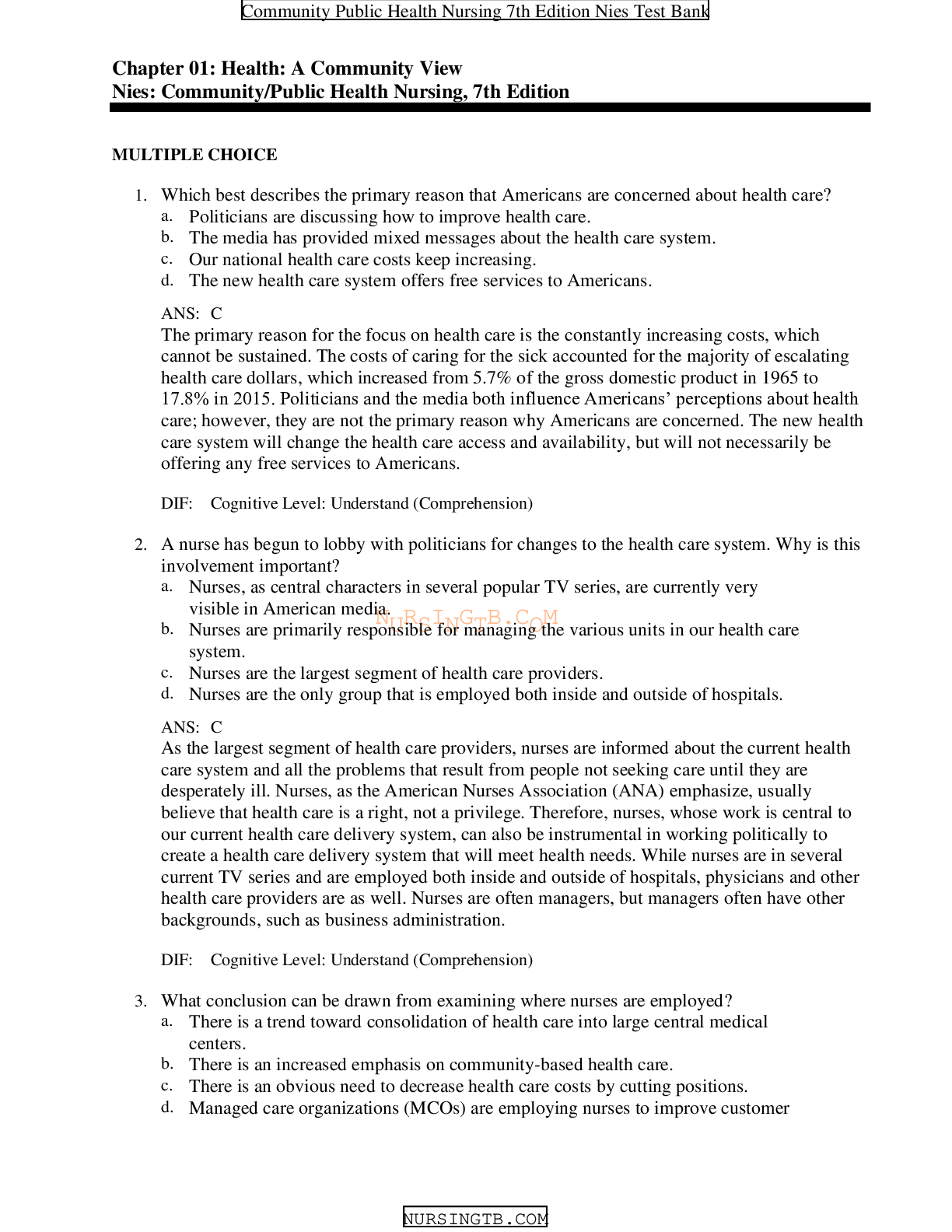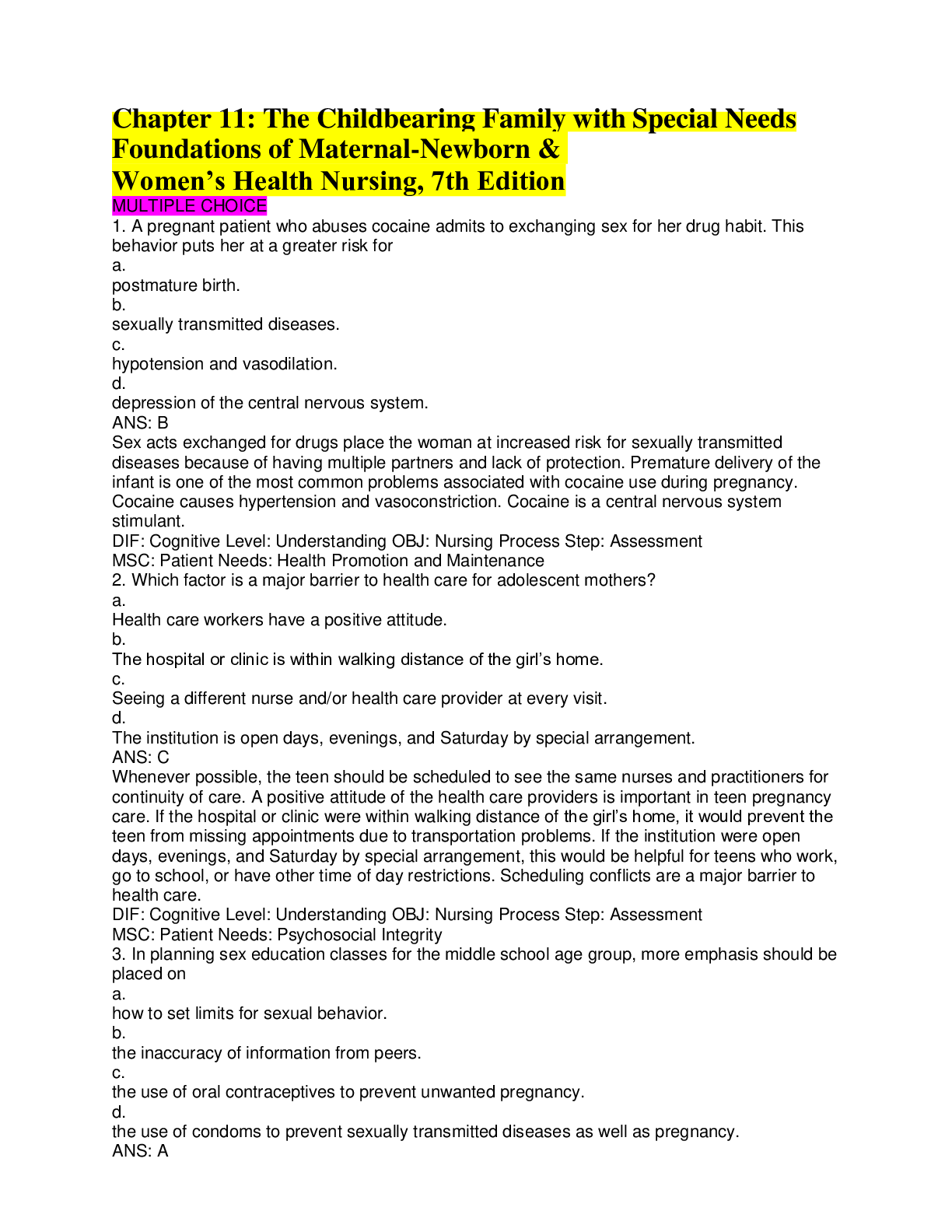*NURSING > TEST BANKS > Foundations of Maternal-Newborn and Women's Health Nursing 7th Edition- Chapter 11-20 (All)
Foundations of Maternal-Newborn and Women's Health Nursing 7th Edition- Chapter 11-20
Document Content and Description Below
Foundations of Maternal-Newborn and Women's Health Nursing 7th Edition- Chapter 11-20-1.A pregnant patient who abuses cocaine admits to exchanging sex for her drug habit. This behavior puts her at a g... reater risk for a. postmature birth. b. sexually transmitted diseases. c. hypotension and vasodilation. d. depression of the central nervous system. ANS: B Sex acts exchanged for drugs place the woman at increased risk for sexually transmitted diseases because of having multiple partners and lack of protection. Premature delivery of the infant is one of the most common problems associated with cocaine use during pregnancy. Cocaine causes hypertension and vasoconstriction. Cocaine is a central nervous system stimulant. DIF: Cognitive Level: Understanding OBJ: Nursing Process Step: Assessment MSC: Patient Needs: Health Promotion and Maintenance 2. Which factor is a major barrier to health care for adolescent mothers? a. Health care workers have a positive attitude. b. The hospital or clinic is within walking distance of the girl’s home. c. Seeing a different nurse and/or health care provider at every visit. d. The institution is open days, evenings, and Saturday by special arrangement. ANS: C Whenever possible, the teen should be scheduled to see the same nurses and practitioners for continuity of care. A positive attitude of the health care providers is important in teen pregnancy care. If the hospital or clinic were within walking distance of the girl’s home, it would prevent the teen from missing appointments due to transportation problems. If the institution were open days, evenings, and Saturday by special arrangement, this would be helpful for teens who work, go to school, or have other time of day restrictions. Scheduling conflicts are a major barrier to health care. DIF: Cognitive Level: Understanding OBJ: Nursing Process Step: Assessment MSC: Patient Needs: Psychosocial Integrity 3. In planning sex education classes for the middle school age group, more emphasis should be placed on a. how to set limits for sexual behavior. b. the inaccuracy of information from peers. c. the use of oral contraceptives to prevent unwanted pregnancy. d. the use of condoms to prevent sexually transmitted diseases as well as pregnancy. ANS: A Setting limits for sexual behavior is particularly important for younger teenagers who may be pressured to become sexually active before they are physically and emotionally ready. Oral contraceptives are not the preferred method of birth control for teenagers because they forget to take them, and they do not protect against STIs. The use of condoms is appropriate and an important concept to discuss but should not be the emphasis. DIF: Cognitive Level: Understanding OBJ: Nursing Process Step: Planning MSC: Patient Needs: Health Promotion and Maintenance 4. Which action should the nurse take when counseling a teenaged patient who has decided to relinquish her baby for adoption? a. Question her about her feelings regarding adoption. b. Tell her she can always change her mind about adoption. c. Affirm her decision while acknowledging her maturity in making it. d. Ask her if anyone is coercing her into the decision to relinquish her baby. ANS: C A supportive affirming approach by the nurse will strengthen the patient’s resolve and help her appreciate the significance of the event. It is important for the nurse to support and affirm the decision the patient has made. This will strengthen the patient’s resolve to follow through. Later the patient should be given an opportunity to express her feelings. Telling her that she can always change her mind about adoption should not be an option after the baby is born and placed with the adoptive parents. It is important that the teenager be treated as an adult, with the assumption that she is capable of making an important decision on her own. DIF: Cognitive Level: Application OBJ: Nursing Process Step: Implementation MSC: Patient Needs: Psychosocial Integrity 5. A patient who is older than 35 years may have difficulty achieving pregnancy because a. prepregnancy medical attention is lacking. b. personal risk behaviors influence fertility. c. contraceptives have been used for an extended period of time. d. the ovaries may be affected by the normal aging process. ANS: D Once the mature woman decides to conceive, a delay in becoming pregnant may occur because of the normal aging of the ovaries. Prepregnancy medical care is available and encouraged. The older adult participates in fewer risk behaviors than the younger adult. The problem is the age of the ovaries, not the past use of contraceptives. Fertility begins to decline at age 32 and decreases more rapidly by age 37. DIF: Cognitive Level: Understanding OBJ: Nursing Process Step: Assessment MSC: Patient Needs: Physiologic Integrity 6. Which health concern is most likely to be an issue for the older mother? a. Nutrition and diet planning b. Exercise and fitness c. Having enough rest and sleep d. Effective contraceptive methods ANS: C The woman who delays childbearing may have unique concerns, one of which is having less energy than younger mothers. The older mother is better off financially and can afford better nutrition. Information about exercise and fitness is readily available. The older mother usually has more financial means to search out effective contraceptive methods. DIF: Cognitive Level: Understanding OBJ: Nursing Process Step: Assessment MSC: Patient Needs: Psychosocial Integrity 7. Which is the most dangerous effect on the fetus of a patient who smokes cigarettes while pregnant? a. Intrauterine growth restriction b. Genetic changes and anomalies c. Extensive central nervous system damage d. Fetal addiction to the substance inhaled ANS: A The major consequences of smoking tobacco during pregnancy are low-birth-weight infants, prematurity, and increased perinatal loss. Cigarettes normally will not cause genetic changes or extensive central nervous system damage. Addiction is not a normal concern with the neonate. DIF: Cognitive Level: Understanding OBJ: Nursing Process Step: Assessment MSC: Patient Needs: Health Promotion and Maintenance 8. A patient at 24 weeks of gestation reports that she has a glass of wine with dinner every evening. Which rationale should the nurse provide this patient regarding the necessity to eliminate alcohol intake? a. The fetus is placed at risk for altered brain growth. b. The fetus is at risk for severe nervous system injury. c. The patient will be at risk for abusing other substances as well. d. A daily consumption of alcohol indicates a risk for alcoholism. ANS: A The brain grows most rapidly in the third trimester and is most vulnerable to alcohol exposure during this time. The major concerns are mental retardation, learning disabilities, high activity level, and short attention span. The risk to the patient for abusing other substances is not the major risk for the infant. It has not been proven that daily consumption of alcohol indicates a risk for alcoholism. DIF: Cognitive Level: Application OBJ: Nursing Process Step: Implementation MSC: Patient Needs: Psychosocial Integrity 9. Which of the following is an example of healthy grieving? a. The mother exhibits an absence of crying or expression of feelings. b. The parents do not mention the baby in conversation with family members. c. The mother asks that the baby be taken away from the delivery area quickly. d. While holding the baby, the mother says to her husband, “He has your eyes and nose.” ANS: D Attachment behaviors are necessary for healthy grieving. Absence of crying and not mentioning the baby may be signs of denial. By not seeing the baby, attachment and therefore healthy grieving will not occur. DIF: Cognitive Level: Understanding OBJ: Nursing Process Step: Assessment MSC: Patient Needs: Psychosocial Integrity 10. A patient has delivered twins. The first twin was stillborn, and the second is in the intensive care nursery, recovering quickly from respiratory distress. The patient is crying softly and says, “I wish my baby could have lived.” What is the most therapeutic response? a. “How soon do you plan to have another baby?” b. “Don’t be sad. At least you have one healthy baby.” c. “I have a friend who lost a twin and she’s doing just fine now.” d. “I am so sorry about your loss. Would you like to talk about it?” ANS: D The nurse should recognize the woman’s grief and its significance. Asking her about plans for another baby is denying the loss of the other infant. Pointing out the health of another baby is belittling her feelings. Stating that the nurse has a friend who lost a twin is denying the loss of the infant and her grief and belittling her feelings. DIF: Cognitive Level: Application OBJ: Nursing Process Step: Implementation MSC: Patient Needs: Psychosocial Integrity 11. Which action is the most appropriate nursing measure when a baby has an unexpected defect at birth? a. Remove the baby from the delivery area immediately. b. Inform the parents immediately that something is wrong. c. Tell the parents that the baby has to go to the nursery immediately. d. Explain the defect and show the baby to the parents as soon as possible. ANS: D Parents experience less anxiety when they are told about the defect as early as possible and are allowed to touch and hold the baby. The parents should be able to touch and hold the baby as soon as possible. The nurse should not take the baby away; this would raise anxiety levels of the parents. They should be told about the defect and allowed to see the baby. DIF: Cognitive Level: Application OBJ: Nursing Process Step: Planning MSC: Patient Needs: Psychosocial Integrity 12. Which environment can assist a pregnant teen to achieve the task of establishing a stable identity? a. Home schooling b. Alternative education program c. School-based mothers’ program [Show More]
Last updated: 2 years ago
Preview 1 out of 5 pages

Buy this document to get the full access instantly
Instant Download Access after purchase
Buy NowInstant download
We Accept:

Reviews( 0 )
$15.00
Can't find what you want? Try our AI powered Search
Document information
Connected school, study & course
About the document
Uploaded On
Jul 05, 2021
Number of pages
5
Written in
Additional information
This document has been written for:
Uploaded
Jul 05, 2021
Downloads
0
Views
96





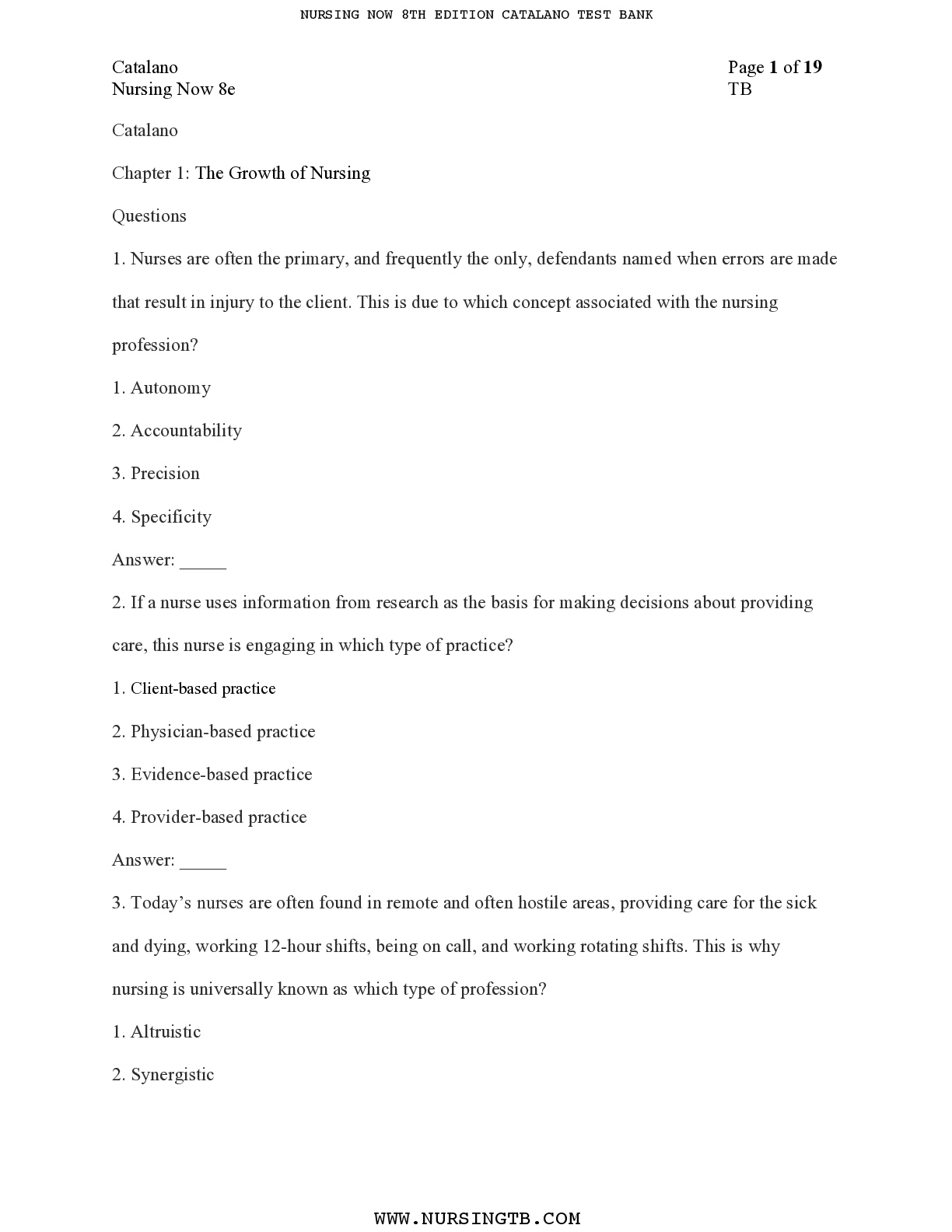



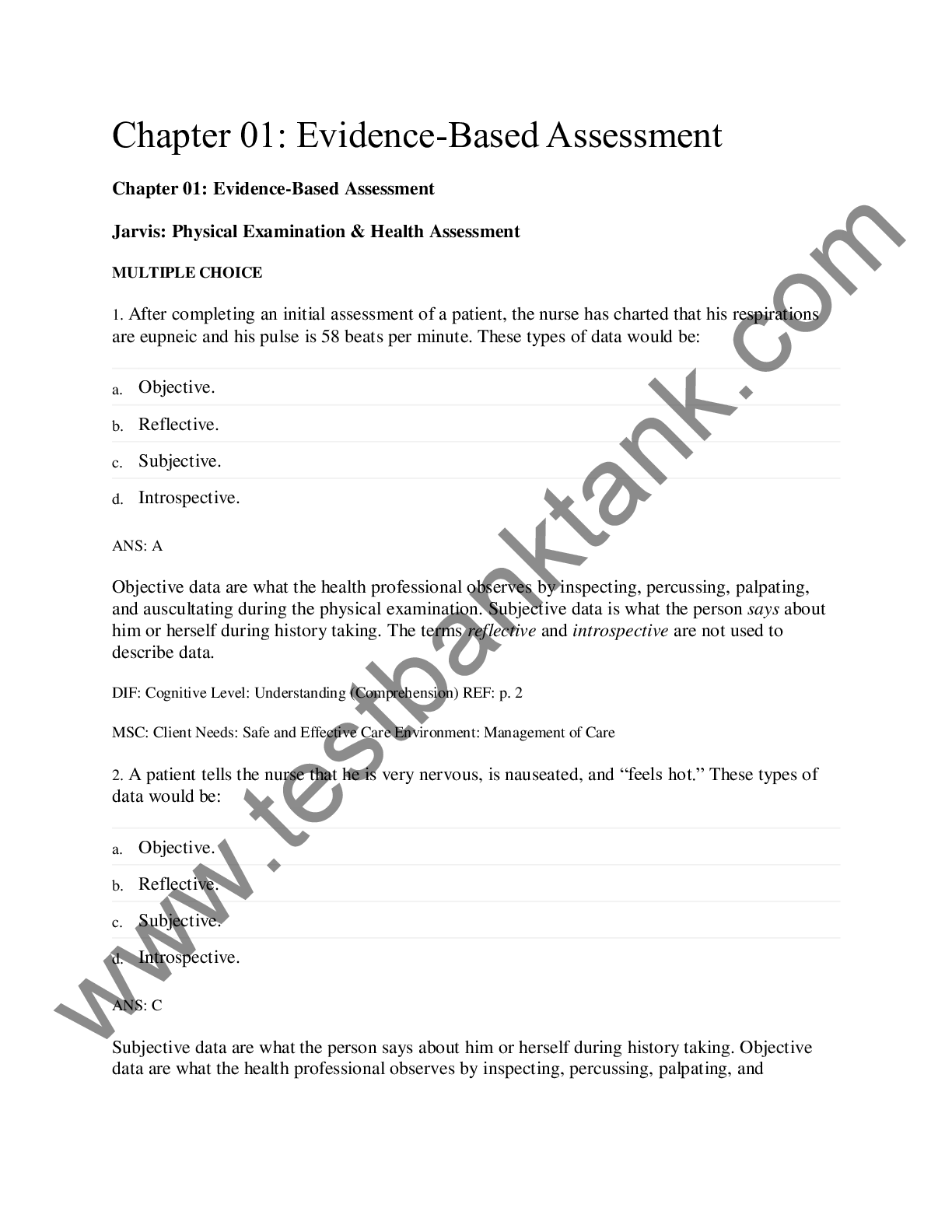


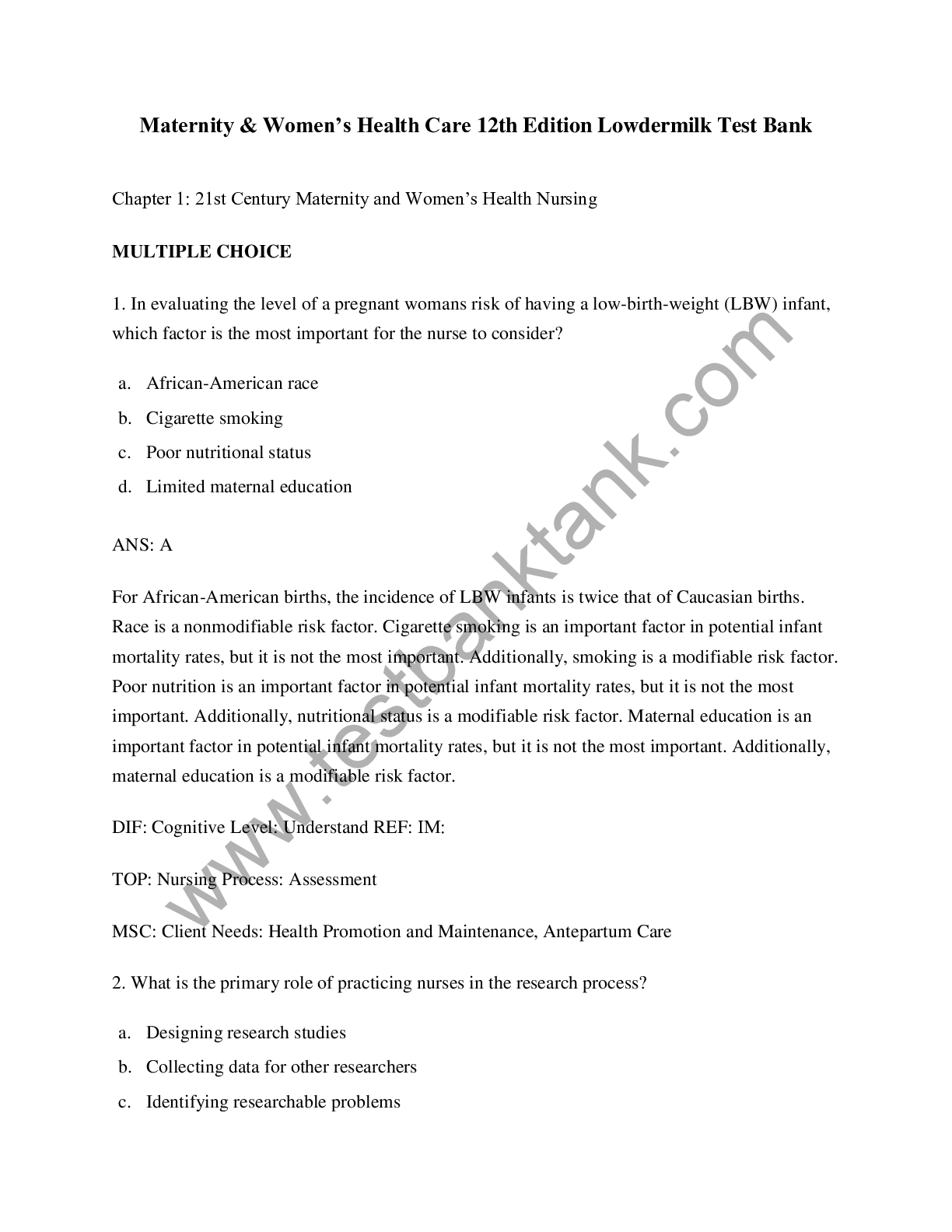




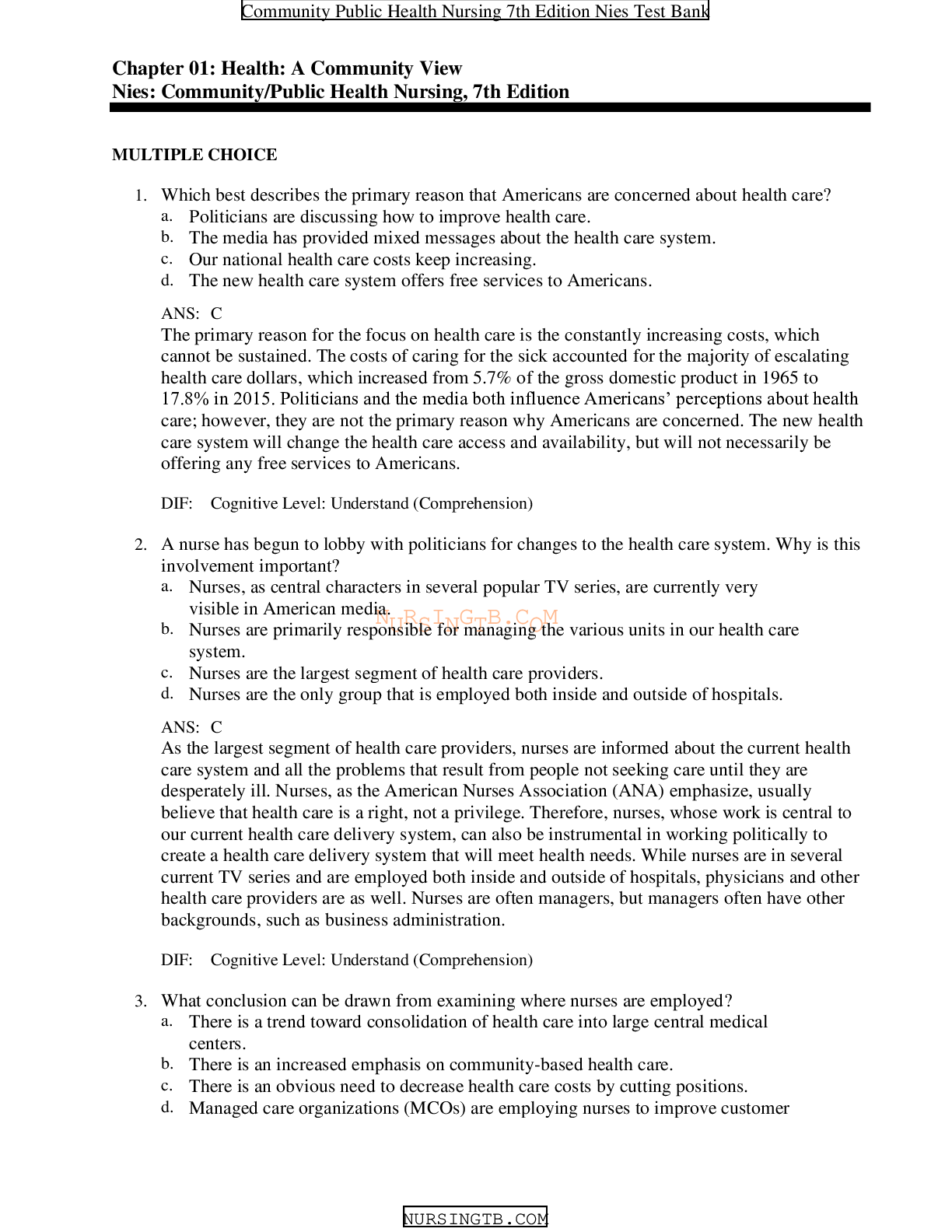
.png)


